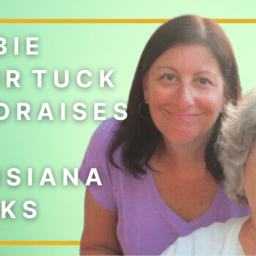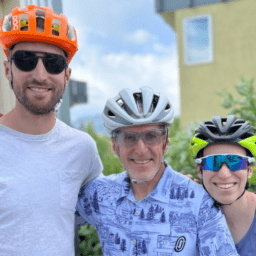NOTES FROM this month’s meetup
Written by Connie Carpenter Phinney
During our October meetup, we had an informative question-and-answer session, and I’m happy to share some key nuggets of insight with you.
Our panelists are familiar to many of you: Pat Donahoo is a care partner for his wife, Cidney, and Gail Gitin was a care partner for her husband, Gene, who passed away almost three years ago. Pat and Gail are both Davis Phinney Foundation Ambassadors. Polly Dawkins is our moderator and the executive director of the Foundation.
Polly is also the moderator for the newly launched—and very popular—Care Partner Training series, that you can register for here.
We started our conversation by discussing resilience: the capacity to adapt to challenging life experiences. During our call, I noted that uncertainty is something those living with—or adjacent to—Parkinson’s get used to over time. I recently read an article in the New York Times in which psychologist Jelena Kecmanovic discusses how the season of fall can help us “work on our acceptance of uncertainty.” Dr. Kecmanovic says that building a tolerance for insecurity— being able to withstand and even embrace life’s roller coaster of unpredictability—can build resilience, making us more adaptable and stronger. She says it’s like accepting that simply being alive is enough.
The essence of the article was the suggestion to look at how we grieve our losses, respond to them, remain upbeat, and accept that change is inevitable and isn’t all bad. The autumn leaves are brilliant before they fall, and then we know they’ll be back. It’s a good time for reflection, acceptance, and nurturing oneself—some good seasonal food for thought.
Bravery and Resilience in Different Circumstances
I mentioned a care partner meetup I attended where each care partner used words like “courageous” or “brave” when discussing their person with Parkinson’s. While that may be true, I wondered about us—the care partners—and asked, “Aren’t we brave?” It’s not easy living with unpredictability, but we learn to do it, and it makes us more resilient.
Pat noted he’d taken a trip with his wife, and while visiting her mother, he recommitted himself to being the best care partner he could be. This is an interesting tactic: to self-evaluate our performance and try to improve. Pat talked about how he’d had the chance to sit with someone whose husband has MS; they were able to connect on many aspects of their roles as care partners—including the mutual acknowledgment of their fatigue.
Gail explained that while in the throes of intense care partnering, you might struggle to realize how hard your “new normal” has become. She failed to recognize how difficult her situation with her husband was until others pointed it out.
Some takeaways from Pat and Gail include the notion that being a care partner is hard, tiring, and often unrelenting, but you learn to adjust and adapt. I noted that resilience teaches us to look forward, not back, because it’s only in the future that we will grow, adapt, and adjust.
An Important Observation from a Listener
We next dove into a very important question from one of our listeners whose husband, recently diagnosed with Parkinson’s, had begun gambling while playing cards. The listener noted this was not a normal behavior for her husband.
This set off red flags for the panelists because we’ve heard this before–especially with those taking dopamine agonists. We aren’t medical professionals, but the panelists agreed that new gambling behavior was worth a call to the prescribing doctor’s office. We have heard of many people who have experienced an array of side effects from taking this class of drugs. While the drugs do work well for many people, others experience side effects having to do with impulse control. Of course, please keep in mind that all medicines have side effects, and any unusual behavior or surprising side effects should be discussed with your medical team.
These experiences help elevate our awareness of how vigilant we have to be to keep our person with Parkinson’s safe.
Lewy Body Dementia
We also had a lengthy discussion about Lewy body dementia (LBD). Gail’s husband Gene had this type of Parkinson’s, and he experienced a rapid decline. Gail recommended several things that helped her husband. She advised ensuring your person stays well-hydrated because this can help with autonomic symptoms–especially neurogenic orthostatic hypotension (NoH). With LBD, it’s essential to get advice from an experienced medical team, increase your access to palliative care that might include other support modalities, and start lining up extra help to give you some respite.
Holidays and Travel
After such a heavy discussion, we leaned into the potentially lighter topic of discussing travel plans for the holiday season. As usual, Gail had some great advice; you can see Gail’s list of travel tips here.
We hope you consider your needs and your person with Parkinson’s before making travel plans, and we highly suggest paring down expectations and scheduling lightly. If you line up mobility assistance at the airport, you’ll get preferred TSA screening, making your care partner job lighter. Remember to bring all your meds on board the plane. You can also ship supplies to your destination if that lightens your load. A specific item Davis and I like to bring is a night light that is triggered by a motion detector. This adds to our confidence and security when sleeping away from home.
If you plan to fly internationally, consider buying evacuation insurance in case of accident or illness. Please note there are vast differences in what is offered, so consider your needs. Davis and I use MedJet because it will transfer us to any hospital of choice–even if it is not deemed medically necessary (meaning you can get flown to a hospital near your home, for example). We buy an annual policy because we frequently travel (and this one comes with an AARP discount). Some policies will only transport you if you require treatments not offered at that hospital, so read the fine print.
If you are on Medicare, you should also check to see where you are covered if you travel internationally and consider what excess travel needs you might require. Insure My Trip is a good place to research options for travel insurance.
For everyday errands and travel, you might consider “tagging” your person with Parkinson’s—if they tend to wander or get lost—with an Apple Airtag or a Tile. This can help you keep track of them using your phone. You can also turn on “tracking” and use apps like Find My to track your person’s phone.
Travel and the holidays should be fun; take care by planning carefully and spending a little more to fly direct or to fly at the time of day when you know your person functions best.
Next Meetup: November 7
We’ll talk more about holiday planning in our November meetup when social worker and longtime Parkinson’s advocate worker Kathleen Crist rejoins us.
Keep in mind Gail’s great words of wisdom: “You are doing the best you can!” Take a deep breath, find time for yourself, and above all, be well.
Additional Resources
Content About Traveling with Parkinson’s
Palliative Care Webinar with Dr. Kluger
Previous Care Partner Meetup About Tools for Living Well with Parkinson’s
Would you like more information
on being a Parkinson’s care partner?
You can learn much more about living well as a Parkinson’s care partner today through our Every Victory Counts® Manual for Care Partners. Click the link below to get your free manual now.
Thank you to our 2023 Peak Partner Amneal for allowing us to make the manual for care partners available and free to all.

















